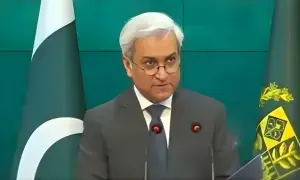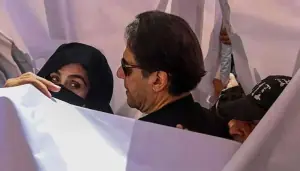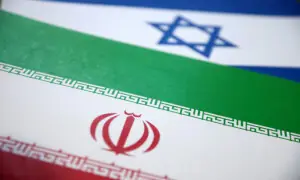More powers for Big Three at ICC meeting

ISLAMABAD: The troubled test championship was dropped before it started and other significant changes to international cricket were agreed in principle by the ICC board on Tuesday, the governing body said.
They were toned down, though, from more radical proposals put forward in an attempt to seize power by the game´s big three: India, England and Australia.
Other possible changes that had "unanimous support" from the board at its meeting in Dubai, according to the International Cricket Council, included an opportunity for non-test-playing countries to win the right to play tests.
A fund was also proposed to give money annually to the seven test countries outside the big three.
While the list of "key principles" agreed was watered down from the major shake-up proposed by the India, England and Australia boards, there was still recognition of the reality of the modern game: India, especially, and to a lesser extent England and Australia are in control because they raise much of the ICC´s revenue.
India alone contributes about 80 percent of the revenue from the sale of television and commercial rights.
Recognizing this, the ICC board — which is made up of the 10 test-playing nations and three representatives of smaller cricket countries — provisionally approved a new five-member executive committee and five-member finance and commercial affairs committee.
They would each include members from India, England and Australia and two others from the ICC board.
The Board of Control for Cricket in India, England and Wales Cricket Board and Cricket Australia had proposed a four-member executive committee with the big three rotating the chair between them and deciding who should join them.
Instead, anyone from the ICC board could eventually be elected to chair the board and anyone on the executive committee or finance and commercial affairs committee could chair those, but only after a "transitional period" ends in 2016.
Until then, India, England and Australia will lead the world body´s top committees.
The ICC didn´t give details of how current non test-playing countries might win the right to play tests.
India, England and Australia had suggested a reduced eight-team top tier for tests with two countries immediately relegated, regular promotion and relegation, but immunity from relegation for the big three.
The ICC board rejected the idea of immunity from relegation, something that especially grated with the other seven test nations, and also suggested there would be no removal of anyone´s test status.
The proposed changes were yet to be formally adopted, with ICC President Alan Isaac saying "extensive work will now be undertaken in advance of a follow-up board meeting next month." Isaac also expressed disappointment that there had been what he called "misconceptions" over the 21-page document initially put forward by the BCCI, ECB and CA, which was leaked, widely criticized and threatened to divide world cricket.
But the fact that those proposals were softened suggests they were opposed by members of the ICC board.
Pakistan and South Africa, two of the leading opponents of the original sweeping changes, stressed the principles laid out Tuesday had to be passed by their own national boards before they would back them at next month´s ICC meeting. "The PCB clearly stated at the (Tuesday) meeting that the guiding principles were subject to PCB´s governing board´s approval," the Pakistan Cricket Board said.
Cricket South Africa said its board would carefully consider the changes before the follow-up meeting on Feb. 8.
Some of the toned down changes agreed in principle are: The test championship planned for 2017 will be dropped and the 50-over Champions Trophy will be retained in its place.
There will be an opportunity for all member countries to play tests "with participation based on meritocracy," the ICC said.
There were no details of a promotion format. The test cricket fund will make money available annually to Pakistan, South Africa, Sri Lanka, West Indies, New Zealand, Bangladesh and Zimbabwe.
This would "encourage and support test match cricket," the ICC said, with the game´s flagship format struggling to make money away from the big three.
South Africa, the top-ranked test team, was excluded from the fund in the BCCI, ECB and CA plans.
Bilateral agreements for test series could come into effect from 2015, a move away from the ICC-controlled Future Tours Program which ensures big teams play series against smaller teams at some point in the rotation.
Bilateral agreements would give India, England and Australia more scope to pick and choose who and when they play.
The ICC said the powerful and rich Indian board would take "a central leadership responsibility."
For two years from this June, the BCCI will chair the ICC board, CA will chair the executive committee and the ECB will chair the influential finance and commercial affairs committee while the governing body undergoes its "transitional period." More money will be made available to the "higher performing" non-test teams. (AP)
SOURCE: AP




















Comments are closed on this story.